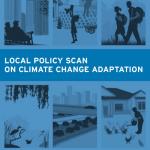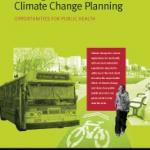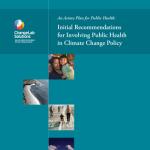Improving Public Health & Equity by Planning for Climate Change Mitigation
A summary of research & guidance for planners & public health practitioners
Climate change is harming public health across every region of the United States. Planners and public health practitioners play critical roles in reducing negative health impacts through climate change adaptation and mitigation.
Climate change is harming health in US communities by increasing extreme heat and weather, air pollution, infectious disease, and food insecurity. Some people and communities are more vulnerable to the negative health impacts of climate change than others.
ChangeLab Solutions collaborated with the Climate and Health Program in the National Center for Environmental Health at the Centers for Disease Control and Prevention (CDC) to help planners and public health practitioners address health and health equity through planning efforts to mitigate climate change. Based on this work, ChangeLab Solutions is developing guidance that summarizes . . .
- Evidence-based connections between climate change mitigation and health
- An assessment of how adopted state and local climate action plans address health and health equity
- Conversations on how public health partners are typically involved in climate change mitigation planning
Mitigating Climate Change Promotes Public Health
Climate change mitigation strategies are actions that reduce emissions of heat-trapping greenhouse gases to slow climate change. Mitigating climate change can reduce the severity of climate-related impacts on health. In addition to reducing direct health impacts of climate change and large-scale health impacts of burning fossil fuels, climate change mitigation strategies can improve public health at the community level through a variety of health pathways. See Improving Public Health and Equity Through Climate Change Mitigation Planning to learn how planners can better connect health and health equity with climate change mitigation planning efforts.
Adapting to Climate Change Is Necessary for Public Health & Critical for Health Equity
Climate change adaptation strategies are actions that protect communities from the expected effects of climate change. Climate change — and the health impacts associated with it — disproportionately affect some communities and populations such as children, older adults, people with disabilities, communities of color, low-income communities, and communities with lower access to resources. Effective climate change adaptation can reduce health inequities associated with climate change. See CDC’s Building Resilience Against Climate Effects Framework to learn how health officials can develop strategies and programs to help communities prepare for the health effects of climate change.



